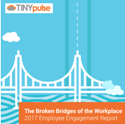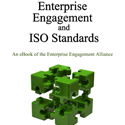Resource Library - Research
Employee Engagement
Published: Jun 1, 2015
Gallup Business Journal recently reported that employees who work for a female manager in the U.S. are actually more engaged, on average, than those who work for a male manager. However, only one in three (33%) working Americans say they currently have a female boss. Female managers themselves tend to be more engaged than male managers. Gallup finds that ... [ read more ]
Published: Sep 16, 2016

Over the past decade or so, more and more organizations are talking about the importance of creating a culture of high engagement with their employees so they will create exceptional customer experiences. However, although employee engagement shows up as a top challenge for ... [ read more ]
This study, conducted by Prof. Frank Mulhern and Patricia Whalen of Northwestern University, identified a significant gap between the view of human resources and employees on the role of employees on delivering customer satisfaction, but found that companies with a close link between human resources and marketing outperform companies that don't.... [ read more ]
Published: Aug 6, 2015

Keeping employees happy, productive and loyal is essential to the long-term health of any company. But generational differences in the workforce tend to complicate matters when it comes to essential elements of employee engagement such as rewards and recognition... [ read more ]
Published: Jul 16, 2015

Tom McMullen, writing recently on the Hay Group blog, notes that a recent study of World@Work members found only 11% of organizations conduct a formal ROI assessment of their reward programs. However, 48% of respondents said they planned to more rigorously assess... [ read more ]
Given that the Incentive Research Foundation (IRF) is charged with advancing the science of incentives, it surveyed industry professionals to obtain their opinions about the more salient trends affecting the industry during 2009 and leading into 2010. The IRF asked these professionals questions on trends with regard to incentive travel programs, merchandise non-cash programs, and budget changes forecast for 2010. Findings indicate that the trends are stabilizing for each of the core issues since March 2009. However, the trends remain significantly lower than in 2008. Survey participants expect more domestic than international destinations, "slightly smaller" budgets, and shorter stays for incentive travel in 2010. A majority of participants also expected decreased award values on the merchandise side.
... [ read more ]
Published: Apr 19, 2022

Close observers of the Stakeholder Capitalism movement will note that there is much talk, but little apparent action beyond public pronouncements and donations. ... [ read more ]
Published: Aug 14, 2013

If recognition is thoroughly woven into the fabric of your culture, it becomes a true measurement tool of individual and organizational performance... [ read more ]
Published: Nov 15, 2017

The 10018 Guidelines on People Involvement and Competence were created by the ISO (International Organization for Standardization) Technical Committee ISO/TC 176, Quality management and quality assurance, Subcommittee SC 3, Supporting technologies. These standards are based on ... [ read more ]
Published: Sep 23, 2015

Employee engagement and recognition: What is the difference and how this affects solution providers and corporate planners. Over the last two decades, the recognition field has become a multi-billion-dollar business with over a dozen leading solution providers and hundreds of smaller ones across the U.S. Companies spend billions on ... [ read more ]
Published: Mar 20, 2017

Seattle, WA-based engagement research firm TINYpulse recently released its 2017 Employee Engagement Report, "The Broken Bridges of the Workplace." After reviewing over a million anonymous employee responses, researchers note that ... [ read more ]
The Incentive Research Foundation (IRF) surveyed industry professionals during the month of April 2010, asking them about incentive travel programs, merchandise/non-cash programs, and ROI/budget considerations. The most promising data show that respondents appear to be more optimistic about the current economic climate than they were in either the Summer or Fall of last year. When asked, "In your opinion, what impact will the economy have on your ability to plan and implement incentive travel programs?" 69% say it will have a positive impact vs. only 33% in the Fall of 2009 and just 24% in the Summer of 2009. Similarly, those who say the economy will have a positive impact on merchandise/non-cash incentive programs increased from 20% (Summer '09) and 26% (Fall '09) to 41% currently. Still, one-third of those surveyed predict that budgets for incentive travel will decrease this year, while 37% say they'll remain unchanged. Things were a little better on the merchandise/non-cash side, where only 22% expect a decline (down from 51%), while 40% predict an increase and 37% say they see no change in budgets. This indicates that although there's an uptick in optimism about the economy in general, it may not translate into more money for programs – at least not in the near term. ... [ read more ]
Published: Sep 13, 2021

Social media, blogs, and e-newsletter technology enable almost any organization to become its own media company to generate leads, enhance thought leadership, build relationships and enhance sales ratios. Very few in business implement strategic integrated communications programs, often because they lack the people with the journalistic and other content creation skills needed for effective content marketing or they fail to integrate the communications programs into their sales and support process. ... [ read more ]
Published: Feb 23, 2015

Don McPherson, President and Co-Founder of Minnesota-based Modern Survey, recently noted that when people say they know and understand the organizational values of the company they work for, those people are 51 times more likely to be "Fully Engaged" than ... [ read more ]
Are there differences in how a computer manufacturer plans and implements an incentive program versus how a pharmaceutical company or new car dealer does? What about a commercial banking operation, insurance agency or a telecommunications company? Are there processes, types of incentives used, or other nuances that are unique to these markets? Which industries are more likely to develop their programs in-house, as opposed to securing an outside vendor? The Vertical Market Study attempts to answer these and other questions. It provides a full report on how the six specific industries planned and implemented incentive travel,
motivational meetings and special events.... [ read more ]
For last year’s Summit, a research study was conducted to assess the drivers of employee satisfaction and engagement and the downstream customer and financial implications of these important employee attitudes. This research identified several unique organizational characteristics driving employee engagement, including employee satisfaction, and identified organizational communication as a key driver of employee satisfaction.... [ read more ]
Published: May 28, 2019

Despite hundreds of billions of dollars spent annually by organizations to engage employees and customers, numerous independent research studies find that neither employee nor customer engagement have improved appreciably in more than a decade. ... [ read more ]
Published: Jan 18, 2021

Conceived in the 1990s, the concept of Total Rewards represented a revolution in thinking related to compensation that to this day has not been fulfilled at many organizations, that is: a strategic, holistic approach to compensation that considers every aspect of the employee experience and his or her capabilities and potential contributions to the organization. ... [ read more ]
Published: Apr 24, 2015
Gallup reports that the percentage of U.S. workers engaged in their jobs rose from an average 31.7% in January to an average 32.9% in February. The latest monthly rate of employee engagement is the highest Gallup has recorded in three years and is a full 1.5 percentage points above where it stood in February 2014.... [ read more ]
Each year in the United States, organizations spend tens of billions of dollars on cash and non-cash rewards for consumer, distributor, sales and employee incentive programs –merchandise, gift cards, group and individual travel programs, time off, cash, etc. But few organizations invest the necessary time to understand which rewards should be used for which people to encourage what outcomes... [ read more ]
General
Published: Feb 20, 2018

Over the last few years, the recognition field has seen a significant shift from traditional length-of-service awards to programs that focus on supporting critical organizational goals -- quality service to internal or external customers, participation in volunteer initiatives, a willingness to go the extra mile, etc. ... [ read more ]
Published: Mar 20, 2019

There's no reason to wait for engagement standards from ISO, the International Organization for Standardization, to profit from engagement. While ISO recently approved the creation of formal standards for engagement, the organization has already created Quality Management Principles and standards for engaging employees in quality management practices... [ read more ]
Published: May 21, 2019

Ask anyone involved with technology implementation, and they'll tell you that the most frequent cause of failure is to strategically and consistently address the people issue. ... [ read more ]
Published: Feb 23, 2016

Everybody's talking about the importance of customer, distributor partner or employee engagement, but what specifically is the field of Enterprise Engagement and why is it critical to your organization and your career?... [ read more ]
Published: Mar 2, 2016

In the old days, when no one could measure the economic benefits of engagement, it was a "nice to have." Now it’s essential. It's a critical competitive edge. With sales growth slowing and competition continuing to grow in many industries, market share goes to those organizations that "wow" not only their ... [ read more ]
Showing Results 101 - 125 of 273































